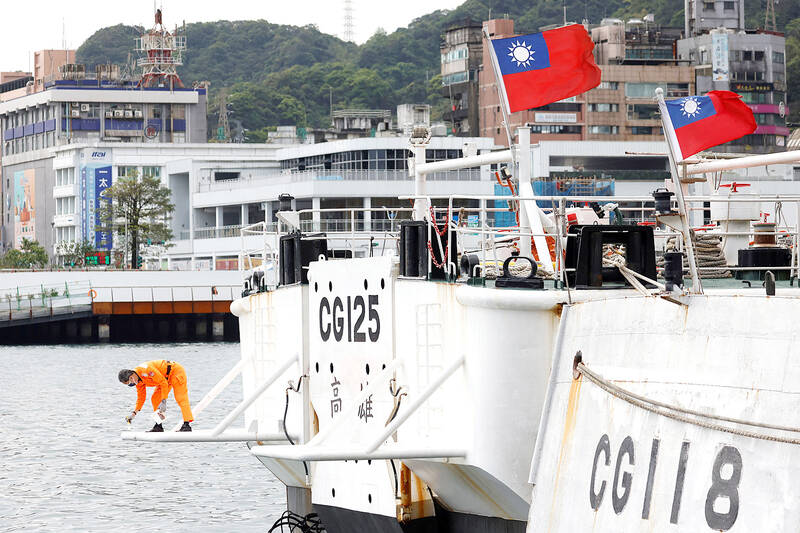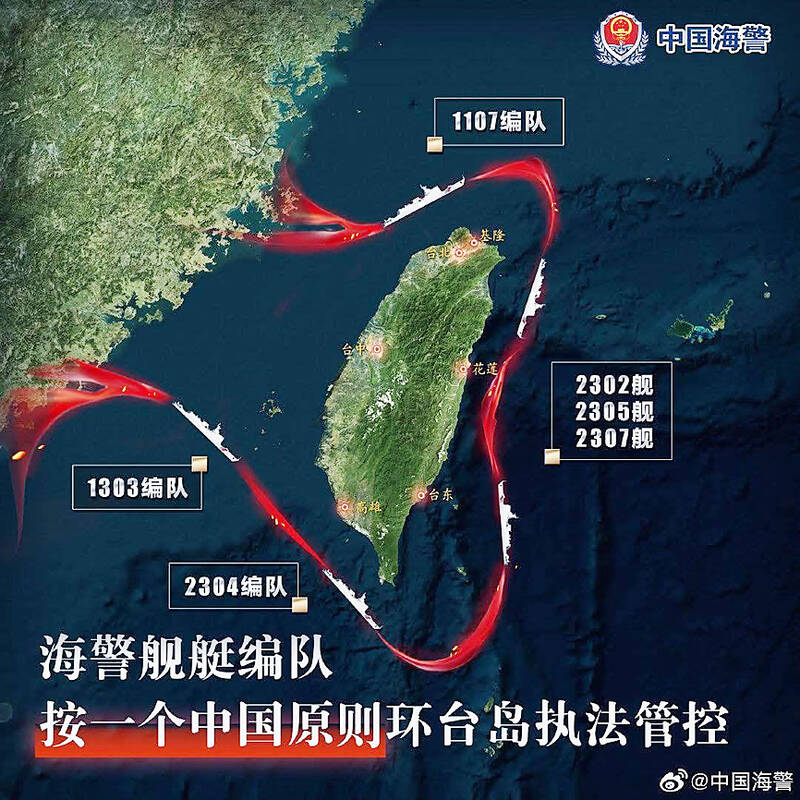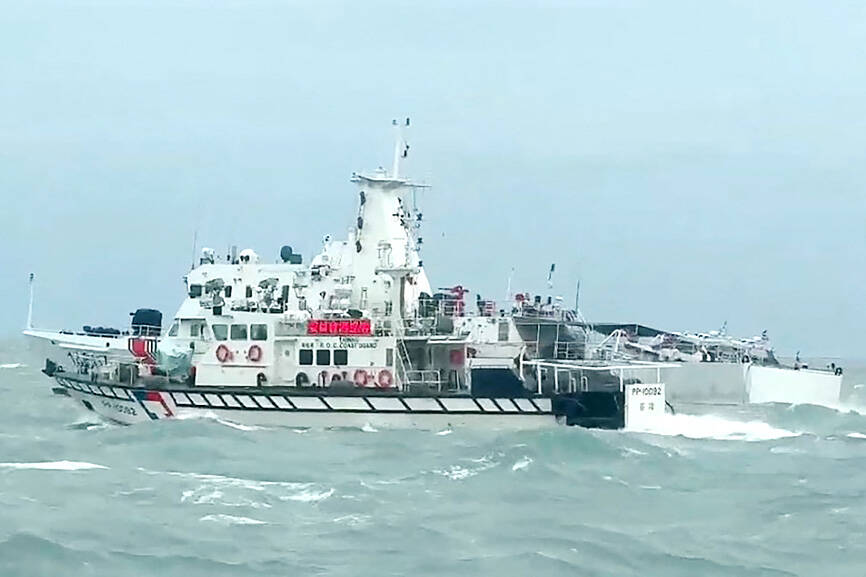China could find a “pretext” to stage new war games around Taiwan this year, coinciding with sensitive dates such as the anniversary next month of a year since President William Lai (賴清德) took office, Coast Guard Administration (CGA) Deputy Director-General Hsieh Ching-chin (謝慶欽) said yesterday.
China yesterday began military exercises around Taiwan, which it said was to “serve as a stern warning and powerful deterrent against Taiwanese independence.”
However, China not give a name to those drills, unlike two war games last year that it dubbed “Joint Sword-2024A,” which was in May, following Lai’s inauguration, and “Joint Sword-2024B” in October, after his Double Ten National Day speech.

Photo: Carlos Garcia Rawlins, Reuters
Meanwhile, the China Coast Guard yesterday said that it conducted “law enforcement patrols” around Taiwan.
Beijing’s pretext could include “special occasions” such as diplomatic events or incidents related to Taiwan’s sovereignty, Hsieh said.
He said that there were two key dates this year around which China could either launch named war games — “Joint Sword-2025” — or what he called “de facto” drills.

Photo from Chinese social media
Apart from the anniversary next month, these include August, when China ends a routine annual ban on fishing, ostensibly to protect fish stocks, and National Day on Oct. 10, when Lai is expected to give a keynote speech, Hsieh said.
Neither the Chinese Ministry of National Defense nor China’s Taiwan Affairs Office responded to requests for comment on the likelihood of such war games.
A separate source, a senior Taiwan security official, said that the assessments were based on experience and Chinese actions, adding that China this year could seek “excuses” to hype up its “gray zone” pressure on Taiwan on those sensitive dates.

Photo: Coast Guard Administration (Taiwan Coast Guard) / AFP
However, Beijing faces a “dilemma” in balancing its “gray zone” aggression on Taiwan while avoiding blowback internationally, the security official said.
“On one hand they want to exert extreme pressures on Taiwan, but on the other hand they must be extremely careful not being labelled as an aggressor internationally,” they said.
The CGA is heavily involved in Taiwan’s response to Chinese military drills and civilian “gray zone” activities such as illegal fishing in its waters, and CGA ships now support the navy in shadowing Chinese warships during drills.
In case of war, the CGA would be pressed into service and ships armed to help defend against a Chinese attack.
Hsieh said that Taiwan has been alarmed by a recent uptick in Chinese activities around Pratas Island (Dongsha Island, 東沙島), an atoll protected as a marine reserve that lies strategically at the top of the South China Sea.
China also claims Pratas Island and its coast guard ships have entered the atoll’s restricted waters several times this year, actions denounced by Taipei as “coercive harassment.”
The China Coast Guard has no publicly available media contacts.
Outlining a new response strategy, Hsieh said that the CGA would evaluate the Philippines “transparency” policy to give details on China’s actions to draw greater international attention.
Additional reporting by AFP

The manufacture of the remaining 28 M1A2T Abrams tanks Taiwan purchased from the US has recently been completed, and they are expected to be delivered within the next one to two months, a source said yesterday. The Ministry of National Defense is arranging cargo ships to transport the tanks to Taiwan as soon as possible, said the source, who is familiar with the matter. The estimated arrival time ranges from late this month to early next month, the source said. The 28 Abrams tanks make up the third and final batch of a total of 108 tanks, valued at about NT$40.5 billion

Two Taiwanese prosecutors were questioned by Chinese security personnel at their hotel during a trip to China’s Henan Province this month, the Mainland Affairs Council (MAC) said yesterday. The officers had personal information on the prosecutors, including “when they were assigned to their posts, their work locations and job titles,” MAC Deputy Minister and spokesman Liang Wen-chieh (梁文傑) said. On top of asking about their agencies and positions, the officers also questioned the prosecutors about the Cross-Strait Joint Crime-Fighting and Judicial Mutual Assistance Agreement, a pact that serves as the framework for Taiwan-China cooperation on combating crime and providing judicial assistance, Liang

A group from the Taiwanese Designers in Australia association yesterday represented Taiwan at the Midsumma Pride March in Melbourne. The march, held in the St. Kilda suburb, is the city’s largest LGBTQIA+ parade and the flagship event of the annual Midsumma Festival. It attracted more than 45,000 spectators who supported the 400 groups and 10,000 marchers that participated this year, the association said. Taiwanese Designers said they organized a team to march for Taiwan this year, joining politicians, government agencies, professionals and community organizations in showing support for LGBTQIA+ people and diverse communities. As the first country in Asia to legalize same-sex

MOTIVES QUESTIONED The PLA considers Xi’s policies toward Taiwan to be driven by personal considerations rather than military assessment, the Epoch Times reports Chinese President Xi Jinping’s (習近平) latest purge of the Chinese People’s Liberation Army (PLA) leadership might have been prompted by the military’s opposition to plans of invading Taiwan, the Epoch Times said. The Chinese military opposes waging war against Taiwan by a large consensus, putting it at odds with Xi’s vision, the Falun Gong-affiliated daily said in a report on Thursday, citing anonymous sources with insight into the PLA’s inner workings. The opposition is not the opinion of a few generals, but a widely shared view among the PLA cadre, the Epoch Times cited them as saying. “Chinese forces know full well that